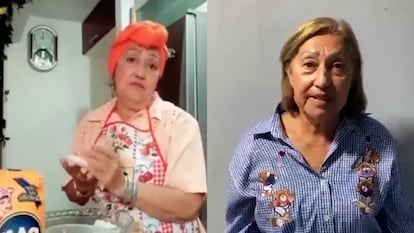Venezuela arrests 72-year-old woman for joking about Maduro’s death on TikTok
Olga Mata was charged with inciting hatred for allegedly promoting the president’s assassination in a comedy video about arepas


Olga Mata’s attempt at comedy has had an unexpected ending. The 72-year-old Venezuelan TikToker uploaded a video joking about arepas, a maize snack, and officials of the Venezuelan government of Nicolás Maduro. The recording went viral, and the Public Prosecutors’ Office ordered her arrest for “incitement to hatred.”
Following a public outcry, Mata was released under order to report to court every 30 days. She was also made to record a new video, from police headquarters, in which she reads a public apology. In the recording, she explains the obvious: that the video was a joke, that she was only trying to be funny, not commit a crime. This difference is not so evident today in Venezuela.
Mata was arrested along with her son Florencio Gil, who appeared in a police report photo. However, he was not mentioned in the arrest warrant released Monday by Attorney General Tarek William Saab, who is one of the officials mentioned in the viral arepa joke. The video shows Mata dressed up as a cook. She is wearing a headscarf and selling arepas reciting well-known flavors like pelúas (meat and cheese) and reina-pepiadas (chicken and mayo), among others. The humor of the video comes from the play of words in the menu.
Mata says she has an arepa de perico – a word commonly used to refer to cocaine – on her menu. The arepa is named Diosdado Cabello, who is a current member of Venezuela’s National Assembly of Venezuela, in allusion to his alleged links with drug trafficking. She also offers an arepa in honor of late Venezuelan leader Hugo Chávez. This arepa is stuffed with mortadella, a word that in criminal slang is synonymous with being dead. The arepa devoted to Iris Varela, a lawmaker in the National Assembly who was previously in charge of the country’s prison system, is made from Harina Pran – a play on words between the traditional brand of Venezuelan cornflour (Harina P.A.N.) and the name given to criminal bosses in prisons.
The arepa named after the Saab comes with eggs, which is a homophobic way to suggest the attorney general is gay. But it was the arepa named after Cilia Flores, the wife of Venezuelan President Nicolás Maduro, that got Mata in the most trouble. In the video, the 72-year-old says she is selling Cecilia Flores arepas as “la viuda” – a word that means widow, but also refers to arepas without fillings. In that moment, a person off-screen tells her that Nicolás Maduro’s wife is not a widow. And Mata, in character, says: “But that’s what we all want.”
The video is no longer on Mata’s TikTok account, which has 156,000 followers and 763,000 likes. Most of the content is made up of the dancing videos and lip-synching skits common to TikTok, although often out of synch. At the end of her apology video, she says she was making reference to another video on TikTok.
Saab released the video of her apology on Twitter, writing: “The lady who through her social network called for the President of the Republic Nicolas Maduro to be killed has publicly apologized for her message.”
The NGO Espacio Público (Public Space) has denounced the case for violating freedom of expression. “Recording and disseminating a video exercising your right to freedom of expression as an individual and member of society, through humor, is not a reason for arrest, nor is it a crime,” the NGO wrote on Twitter.
Pedro Vaca, the Special Rapporteur for Freedom of Expression of the Inter-American Commission on Human Rights, shared a similar sentiment. “In a full democracy, political leaders are tolerant of criticism, the prosecution does not pursue satire, and there are greater guarantees for the expression of those with less power. The case of Olga Mata in Venezuela shows all the repressive weight of power over citizen expression,” he tweeted.
In Venezuela, comedy shows on television and radio disappeared during Hugo Chávez’s rule, but persecution of critics and dissent against the Venezuelan government has intensified since the so-called “Law Against Hate.”
This regulation was passed in 2017 by the Constituent Assembly, a legislative body created by Maduro as a counterpoint to the National Parliament, which at that point was controlled by the opposition. Once pro-Maduro parties regained control of Parliament, the Constituent Assembly was dissolved, but the laws it approved remain in force.
According to a report by Espacio Público, the “Law Against Hate” was used or invoked in 101 violations of freedom of expression between 2017 and mid-2021. Mata joins several other Venezuelans who have been arrested for Twitter comments, opinion articles and videos that joke about high-ranking government officials. These unfortunate attempts to make people laugh like Chris Rock at the Oscars have been met with worse consequences than Will Smith’s slap.
Tu suscripción se está usando en otro dispositivo
¿Quieres añadir otro usuario a tu suscripción?
Si continúas leyendo en este dispositivo, no se podrá leer en el otro.
FlechaTu suscripción se está usando en otro dispositivo y solo puedes acceder a EL PAÍS desde un dispositivo a la vez.
Si quieres compartir tu cuenta, cambia tu suscripción a la modalidad Premium, así podrás añadir otro usuario. Cada uno accederá con su propia cuenta de email, lo que os permitirá personalizar vuestra experiencia en EL PAÍS.
¿Tienes una suscripción de empresa? Accede aquí para contratar más cuentas.
En el caso de no saber quién está usando tu cuenta, te recomendamos cambiar tu contraseña aquí.
Si decides continuar compartiendo tu cuenta, este mensaje se mostrará en tu dispositivo y en el de la otra persona que está usando tu cuenta de forma indefinida, afectando a tu experiencia de lectura. Puedes consultar aquí los términos y condiciones de la suscripción digital.








































